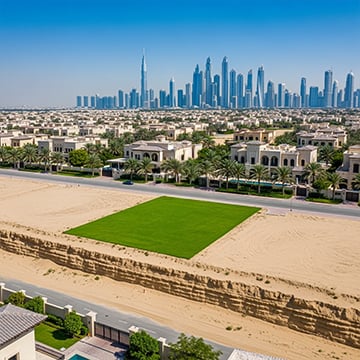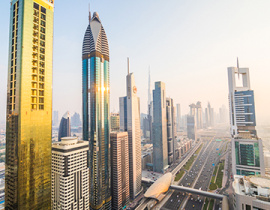- Home
- Blog
- Buying Guide
- Buying Land in the UAE as a Foreigner
Buying Land in the UAE as a Foreigner
Buying land in the UAE is increasingly appealing for international investors and expats. With a stable economy, modern infrastructure, and attractive investment opportunities, the UAE presents a unique landscape for land ownership. However, navigating the legal framework and understanding local regulations is crucial before making a purchase. This guide explores how foreigners can buy land in the UAE, the available options, and what to expect during the process.
Understanding Land Ownership in the UAE
 Many people ask, ‘’Can foreigners buy land in the UAE?’’ The answer is yes. Foreign ownership of land in Dubai and other emirates is possible, but it comes with specific conditions. The UAE distinguishes between freehold and leasehold land rights. Freehold land ownership in the UAE means that buyers can own the land and any property built on it outright, with their name registered on the title deed. Leasehold, on the other hand, grants long-term use of a property for periods up to 99 years, while usufruct allows usage rights without owning the land itself. So the answer to the ‘’Can you buy land in the UAE?’’ is yes, it has different kinds of ownership options.
Many people ask, ‘’Can foreigners buy land in the UAE?’’ The answer is yes. Foreign ownership of land in Dubai and other emirates is possible, but it comes with specific conditions. The UAE distinguishes between freehold and leasehold land rights. Freehold land ownership in the UAE means that buyers can own the land and any property built on it outright, with their name registered on the title deed. Leasehold, on the other hand, grants long-term use of a property for periods up to 99 years, while usufruct allows usage rights without owning the land itself. So the answer to the ‘’Can you buy land in the UAE?’’ is yes, it has different kinds of ownership options.
Each emirate sets its own rules for foreign property ownership. Dubai is known for offering the most liberal approach, allowing non-UAE and non-GCC nationals to buy freehold land in designated areas. Abu Dhabi has updated its regulations to permit foreigners full ownership in selected investment zones. Sharjah and Ras Al Khaimah also allow freehold purchases in specific areas, providing diverse opportunities for international investors.
Emirate-Specific Opportunities
Foreigners looking to buy land in the UAE can explore various freehold zones. In Dubai, these include popular areas for residential and commercial development. Abu Dhabi permits foreign ownership on Saadiyat Island, Yas Island, Al Raha Beach, Masdar City, and Al Reef. Sharjah has opened up new areas for freehold ownership while retaining long lease and usufruct options. Ras Al Khaimah allows purchases within freehold communities, offering flexibility for investment or personal use.
Free economic zones also present attractive options. These zones, such as Jebel Ali Free Zone, Dubai South Free Zone, and Sharjah Airport Free Zone, enable full foreign ownership of land and property, coupled with tax incentives, simplified registration, and advanced infrastructure. For investors seeking commercial or development projects, these zones are a springboard to growth.
Detailed look at freehold zones for land for sale in the UAE;
When it comes to the United Arab Emirates, Dubai is often the first city that comes to mind. The city offers a wide range of freehold areas for investors and residents. Popular neighborhoods include Business Bay, Dubai Marina, Downtown Dubai, Damac Hills, Jumeirah Village Circle, Palm Jumeirah, Al Jaddaf, and many more. If you are looking to buy freehold land in the UAE, Dubai’s diverse communities provide excellent opportunities for both residential and investment purposes.
 Abu Dhabi, the capital city of the UAE, also boasts attractive freehold zones. These include Saadiyat Island, Yas Island, Al Raha Beach, Masdar City, Al Reef, and Al Reem Island. These areas are particularly appealing due to their modern infrastructure and proximity to key business and leisure hubs.
Abu Dhabi, the capital city of the UAE, also boasts attractive freehold zones. These include Saadiyat Island, Yas Island, Al Raha Beach, Masdar City, Al Reef, and Al Reem Island. These areas are particularly appealing due to their modern infrastructure and proximity to key business and leisure hubs.
In Ras Al Khaimah, Marjan Island stands out as a prominent freehold destination, offering scenic waterfront properties and resort-style living.
Sharjah has steadily expanded its freehold offerings, with options such as Al Mamzar, Al Rifaah, Aljada, Tilal City, and more, catering to families and investors looking for affordable yet high-quality properties.
Umm Al Quwain is emerging as an attractive freehold destination with zones like Siniyah Island, Umm Al Quwain Marina Freehold Zone, Downtown Umm Al Quwain, and other promising areas.
Understanding the UAE property ownership laws for foreigners is crucial before making a purchase, as these regulations define where and how expatriates can acquire property in different emirates.
The Legal Process and Required Documents for Purchasing Land in the UAE
Your answer to the question of how to buy land in the UEA is here. Buying land in the UAE as a foreigner involves a series of legal steps. The process begins with verifying property ownership and ensuring there are no legal disputes. Documents required to buy land in the UAE typically include:
- Passport copy
- Proof of financial capability
- Employment documents
- Certificate of no criminal record
- Medical insurance
The legal process to buy land in the UAE includes selecting the land, buying it, and verifying property ownership. Once the documents are submitted, the transaction is recorded with the local land department. For off-plan plots, the initial proof of ownership is called Oqood in Dubai, which remains until the final title deed is issued. Registration fees vary depending on the property value, ranging from 2,000 to 4,000 dirhams, with a 4% transfer fee payable to the Dubai Land Department and additional administrative costs.
Foreigners can also access mortgages for land purchases in the UAE, although lenders often have specific criteria and require higher down payments compared to local buyers. Understanding tax implications and resale conditions is essential. While there is no property tax f or owners, municipal service fees and a 5% federal VAT on commercial properties apply.
or owners, municipal service fees and a 5% federal VAT on commercial properties apply.
Investment Potential and Use Cases
There are several reasons to buy land in UAE. Investors can buy development land in UAE to construct residential or commercial projects, or buy land for a custom villa in UAE to design a personal residence. Those looking for financial growth can buy land in UAE for investment, capitalizing on the country’s booming real estate market.
The flexibility of ownership options allows foreigners to choose a style that fits their long-term plans. Freehold land for sale UAE provides complete control over property, while leasehold and usufruct offer alternatives in areas where freehold is restricted. Proper legal advice ensures compliance with UAE property ownership laws for foreigners and smooth inheritance planning, as expat-owned land can be passed on according to local regulations.
Risks and Considerations When Buying Land in the UAE
Despite the advantages, foreign investors must be cautious. Currency fluctuations, potential legislative changes, and market dynamics can affect returns. Working with reputable real estate agencies and local legal advisors is essential to mitigate risks. Understanding the nuances of foreign land investment in the UAE ensures that investors make informed decisions and safeguard their assets.
Next Steps for Buying Land in the UAE
Buying property in the UAE as a foreigner is both feasible and rewarding, provided buyers navigate the legal landscape carefully. With the right guidance, foreigners can secure freehold land ownership in the UAE, access lucrative investment opportunities, and enjoy the benefits of a stable, investor-friendly environment.
Whether the goal is to buy land for custom villas, development projects, or pure investment, understanding the emirate-specific rules, required documents, and financial obligations is key to a successful transaction. Proper planning, professional support, and a clear strategy ensure that foreign land investment in UAE is a smooth and profitable experience.
Frequently Asked Questions
Can a foreigner buy land in the UAE?Yes, foreigners can buy land in Dubai. When buying land, check if the area is freehold or leasehold. In freehold areas, foreigners own the land completely. In leasehold areas, you only have the right to use the land for a set time, usually 49 or 99 years. If the land is leasehold, you cannot own it fully; you can only lease it for that time.








